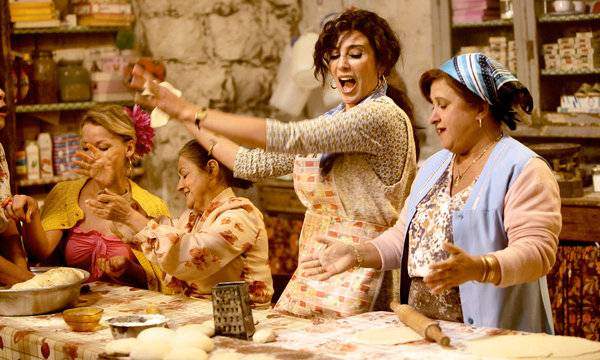Where Do We Go Now?
If you like films rich in cultural references and with plenty of moments to make you laugh and cry, this is one for you.
Overview
Building on the success of her entertaining debut film Caramel, the multi-talented actress, writer and director Nadine Labaki creates a gravely satirical yet heartwarming story with Where Do We Go Now?
Relations between the Muslim and Christian men in the Lebanese village where Amale (Labaki) lives, have historically been volatile. It's not that the men don't get along, but living in a country where religious conflict is always bubbling away means they are constantly ready to fight one another. When unrest occurs outside the village, the men react but the women, unwilling to endure more bloodshed, launch a counter attack involving media censorship, a religious miracle, sexy Belarusian women and other tricks.
The beauty of this film lies in the delicate balance maintained between humour and heartache. Grief has become an everyday part of life here. As one of the Belurisian ladies points out, there are more crosses in the graveyard than people in the village. The female friendships run very deep, accustumed as they are to burying their men folk. The romantic layer of the story is played out between Amale and handyman Rabih (Julian Farhat), who desperately try to appear indifferent to one another but fail to hide from everyone their true feelings.
She's Christian and he's Muslim so the closest they can come to being together is through stolen glances and a fantasy world that plays out in their heads where they serenade on another with a shared song. This is not meant as a lead up to him 'getting the girl' - the object here to show how problematic it still is for people of different religious to marry or be together in Lebanon. While not strictly a musical, there's quite a lot of singing in this film and the music, written by Labaki's husband Khaled Mouzanar, matches the mood perfectly everytime. The lyrics written by her friend Tania Saleh are clever and humorous.
The film has been criticised of insinuating that if women were in charge of the Middle East, war would cease. I think that is taking the fantasy elements of the film a little too literally. While it is true that Labaki was pregnant with her first child when she wrote the screenplay and wanted to deal with a mother's obsession to protect her children, she has not created a heavily political film and the idea women alone can stop the war is just as absurd as the war itself.
Labaki has created a universal story of friendship, camaraderie, loss and humour which totally hits the mark for me. If you like films rich in cultural references and with plenty of moments to make you laugh and cry, this is one for you.





